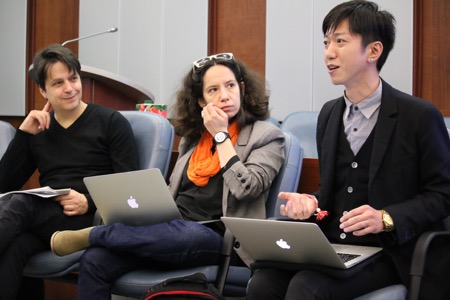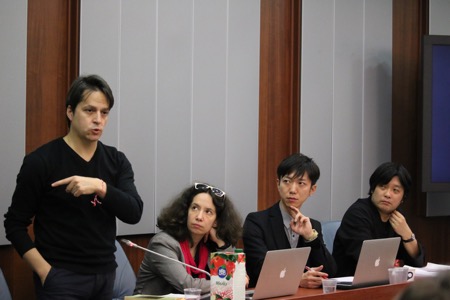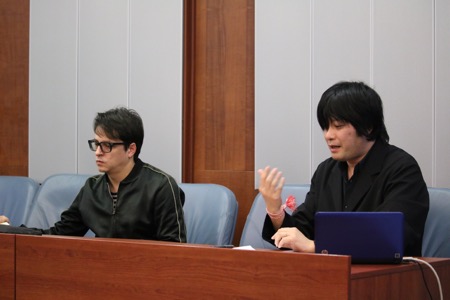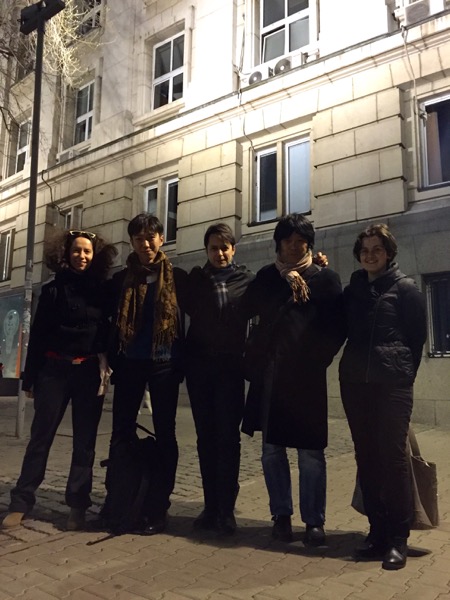[Report] International Forum “The Sublime and the Uncanny” (1)
We held the international forum “The Sublime and the Uncanny” at Sofia University, Bulgaria. This forum was co-organized by the Sofia Literary Theory Seminar (SLS), the Cultural Center of Sofia University, and the University of Tokyo Center for Philosophy (UTCP).
In the autumn of 2013, Profs. Boyan Manchev (New Bulgarian University), Darin Tenev (Sofia University), and Yasuo Kobayashi (University of Tokyo) organized the forum “Metamorphosis and Catastrophe” in Sofia, through which young scholars from the University of Tokyo and Sofia University conceived a plan for the next meeting. Through conversation with Dr. Kamelia Spassova, who had organized a long-term seminar on das Unheimliche (the uncanny) with her colleagues, I decided to focus on the two notions in this forum: the “sublime” and the “uncanny.”
On March 2, in the opening session, I gave a talk entitled “Materialist Aesthetics: Bourriaud, Harman, Rancière.” My talk focused on contemporary aesthetics, especially, Nicolas Bourriaud’s Relational Aesthetics (1998) and the debates that followed it. On the one hand, Jacques Rancière has criticized relational artists in The Emancipated Spectator (2008); on the other hand, Graham Harman has elaborated a theory on non-relational aesthetics in his “Art without Relation” (2014). My aim was to draw a map of the contemporary debate in art theory starting with relational aesthetics, and to show its “material” sphere that goes beyond the dichotomy of “form” and “matter,” one of whose resources is Louis Althusser’s “aleatory materialism” or “materialism of encounter.” At the same time, it was my personal attempt to respond to recent works by Prof. Boyan Manchev, one of whose talks in Vienna offered an idea called “Aisthetic Materialism.” So it was a great pleasure to have his response after my talk.

On March 3 and 4, we held workshops on the “sublime” and the “uncanny” in the morning. All participants were required to read basic materials, such as Kant’s Critique of Judgment (1790) and Freud’s The Uncanny (1919). Based on such classical texts, we discussed these notions, along with their successors in the 20th century such as Heidegger, Derrida, Lyotard, and Kristeva.
In the afternoon sessions, moderated by Profs. Boyan Manchev and Yuji Nishiyama (Tokyo Metropolitan University), we had ten presenters in total. I gave a presentation titled “The Sublime and Capitalism in Jean-François Lyotard,” where I examined Lyotard’s criticism of capitalism since 1970s and pointed out the ambiguity of the sublime.
Throughout the forum, we had stimulating sessions and enthusiastic discussions. Furthermore, during our stay, we received a very warm welcome from the friends in Sofia. I would like to express my sincere gratitude to all the participants, especially to Kamelia Spassova, Boyan Manchev, and Darin Tenev for their friendship.
- Futoshi HOSHINO (University of Tokyo)

This is my second trip to Bulgaria. The first time, I had the pleasure of being invited by Dr. Darin Tenev in Sofia and Plovdiv in 2013 to have a screening of my documentary film The Right to Philosophy and to give a conference on the catastrophe. After having left Bulgaria, I felt immediately “I have to go back there,” because I had a great opportunity to have very rich academic dialogues with Bulgarian scholars and students.
The international forum is titled “The Sublime and the Uncanny”: the former is defined in comparison with the notion of the beautiful mainly by Burke and Kant, the latter is principally formulated on the psychological interpretation of Freud and on the ontological interpretation of Heidegger. Both concepts are deeply associated with the subjectivity, namely, (auto-)affection of subject, so it would be rather difficult to ascribe the sublime and the uncanny to the simple object inherent in matters. These two concepts seem closely tied rather to the notion of tragedy, which doesn’t necessarily assure the happy end.
The three-day forum was very well organized by the heavenly match of Bulgarian and Japanese young assistant professors, Kamelia Spassova and Futoshi Hoshino. The latter has finished his thought-provoking dissertation on the genealogy of the rhetorical sublime from Longinus; the former has already given a content-rich seminar on the uncanny with her colleagues. In the morning session, we had a free discussion in order to draw an outline of the notions of sublime and uncanny, rather than to conceive them and to reach a final agreement. Guided by the two young scholars, we could have a really exciting and successful discussion in a conciliatory mood.

In my presentation “After the End of the World: Of an Apocalyptic Tone in Derrida’s Later Years,” I tried to elucidate the apocalyptic expression “the end of the world” which Derrida repeats in the last years of his life. In fact, the fantasme of the end of the world is exactly the uncanny vision for all the existences. Derrida quoted the last line of a poem by Paul Celan “Große, glühende Wölbung” (Vast, Glowing Vault): “The world is gone. I must carry you.” This line is built into two heterogeneous phrases: a constative to describe a fact of the end of the world, and a performative both in the duty and the promise made to carry you. I analyzed his interpretations of the end of the world around this line from three perspectives: 1) the end of the world as a moment to answer to the other; 2) the self-destruction of the world in the time of the world war; 3) as if the world of cohabitation would be at the end of the world.
Thanks to the Bulgarian professors and students, our six days’ stay in Sofia passed smoothly and we really enjoyed all of the academic activities. I’d like to express my heartful thanks especially to Kamelia Spassova, Darin Tenev and Boyan Manchev. During our stay in Sofia, we were blessed with good weather as if the spring arrived with us from Tokyo. The blessed spring will arrive to our activities of the Humanities thanks to such a long succession of international exchanges.
- Yuji NISHIYAMA (Tokyo Metropolitan university)







